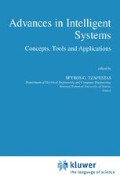Abstract
Current Information Extraction (IE) systems extract, in most cases, fixed information from documents [1,2]. This information pertains only to four distinct tasks: named entity recognition, coreference identification, template elements filling, and scenario-based template elements filling. Thus, providing these systems with the capability of locating stylistic features in a text and thus detecting its genre, it would be possible to meet specific user interests. For instance, users are often looking for texts on a certain topic with particular, quite narrow generic properties, such as authoritatively written documents, opinion pieces, scientific articles, and so on.
Access this chapter
Tax calculation will be finalised at checkout
Purchases are for personal use only
Preview
Unable to display preview. Download preview PDF.
References
Azzam S., Humphreys K., Gaizauskas R., Cunningham H. & Wilks Y. (1997), “Using a Language Independent Domain Model for Multilingual Information Extraction”, Proceedings of the 2nd Workshop on Multilinguality in Software Industry, Nagoya.
Bowden P., Halstead P. & Rose T. (1996), “Knowledge Extraction and Text Analysis Using Conceptual Relation Markers”, Proceedings of the AISB 1996 Workshop on Language Engineering for Document Analysis and Recognition, Brighton.
Cluett R. (1990), “Canadian Literary Prose: A Preliminary Stylistic Atlas”, ECW Press.
Biber D. (1995), “Dimensions of Register Variation: A cross-linguistic comparison”, Cambridge University Press.
Karlgren J. (1996), “Stylistic Variation in an Information Retrieval Experiment”, Proceedings of the Association for Computational Linguistics.
Kessler B., Nunberg G. & SchUtze H. (1997), “Automatic Detection of Text Genre”, Proceedings of the Association for Computational Linguistics.
Michos S. E., Stamatatos E., Fakotakis N. & Kokkinakis G. (1996), “An Empirical Text Categorizing Computational Model Based on Stylistic Aspects”, Proceedings of the 8th IEEE International Conference on Tools with Artificial Intelligence, Toulouse.
Riesel E. (1963), “Stilistik der deutschen Srache”, 2nd Edition, Moskau.
Dermatas E. & Kokkinakis G. (1995), “Automatic Stochastic Tagging of Natural Language Texts”, Computational Linguistics, vol. 21, no. 2, pp. 137–163.
Technical Annex of the Esprit-860 Project (1986), “Linguistic Analysis of the European Languages”.
Sgarbas K., N. Fakotakis & G. Kokkinakis (1995), “A PC-KIMMO Based Morphological Description of Modern Greek”, Literary and Linguistic Computing, Vol. 10, No. 3, Oxford University Press, New York.
Michos S. E., N. Fakotakis & G. Kokkinakis (1995), “A Novel and Efficient Method for Parsing Unrestricted Texts of Quasi-Free Word Order Languages”, International Journal on Artificial Intelligence Tools, Vol.4, No. 3, pp. 301–321.
Hovy E.H. (1990), “Pragmatics and Natural Language Generation”, Artificial Intelligence, vol. 43, pp. 153–197.
DiMarco C. & Hirst G. (1993), “A Computational Theory of Goal-Directed Style in Syntax”, Computational Linguistics, vol. 19, no. 3, pp. 452–459.
Author information
Authors and Affiliations
Editor information
Editors and Affiliations
Rights and permissions
Copyright information
© 1999 Springer Science+Business Media Dordrecht
About this chapter
Cite this chapter
Michos, S.E., Fakotakis, N., Kokkinakis, G. (1999). Using Functional Style Features to Enhance Information Extraction from Greek Texts. In: Tzafestas, S.G. (eds) Advances in Intelligent Systems. International Series on Microprocessor-Based and Intelligent Systems Engineering, vol 21. Springer, Dordrecht. https://doi.org/10.1007/978-94-011-4840-5_13
Download citation
DOI: https://doi.org/10.1007/978-94-011-4840-5_13
Publisher Name: Springer, Dordrecht
Print ISBN: 978-1-4020-0393-6
Online ISBN: 978-94-011-4840-5
eBook Packages: Springer Book Archive

